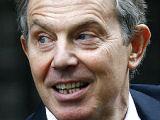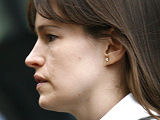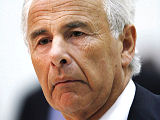5 Minute Guide: Cash for honours?
Updated on 20 July 2007
It's an expensive business running a political party - and someone has to pay for it. Police were called in to probe claims that parties were giving peerages to rich businessmen who offered them secret loans. Even Tony Blair faced questioning. But after dawn raids, serial leaks and many hostile front pages, in July police announced that no-one would face charges.
What happened?
The police investigated claims honours were given by political parties in return for donations and loans.
The issue came to the forefront of media attention in the spring of 2006, after it emerged millionaire Chai Patel had been nominated for a peerage after donating £100,000 to the Labour Party and making a secret loan of £1.5m.
It was then revealed a further two millionaires who gave secret loans were also nominated by Blair for peerages. The probe then widened to include other parties.
Labour revealed it had been secretly loaned £14m ahead of the last election, the Conservatives had borrowed £16m from 13 wealthy backers and the Liberal Democrats said they owed £850,000 from three backers.
One of the key figures in the enquiry was Lord Levy, who since 2000 had been Blair's personal envoy to the Middle East.
The suspicion was that the people lending parties money were trying to buy influence.
Biotech boss Sir Christopher Evans, who lent Labour money, was also arrested and questioned as was Des Smith, a head-teacher who helps find sponsors for the government's flagship city academies programme. All deny wrongdoing.
There was nothing legally wrong with people lending parties money but the suspicion is that they were trying to buy influence.
It relates to a law from 1925, brought in five years after Lloyd George was accused of selling political honours.
Labour PM Harold Wilson resigned in 1976 after it emerged wealthy donors had given to the party - a scandal known as the Lavender List.
Why did it happen?
Running a political party - especially successful election campaigns - is an expensive business.
Parties in the UK are not funded by the state; at the 2005 General Election both the Conservatives and Labour raised about £18m each for their campaigns.
Lord Levy was dubbed "Lord Cashpoint" by the press.
Therefore, parties engage fundraisers to bring in cash - which is what Lord Levy, dubbed "Lord Cashpoint" by the press, was responsible for.
The controversy started because while official donations were publicised by the Electoral Commission, a loophole in the law means loans were not. A new law brought in by the Labour Party in 2000 forced all donations of £5,000 and more to be declared.
What happened next?
Following complaints under three different sets of legislation - laws which effectively prevent the corrupt procurement and award of honours - the Metropolitan Police launched an investigation.
The parliamentary Public Administration Select Committee also began an inquiry, although MPs agreed to postpone it until police completed enquiries.

Most recently, Tony Blair was himself questioned by officers on 14 December 2006.
In January 2007 the prime minister's close aide Ruth Turner was arrested in a dawn raid and released on bail.
In addition to being quizzed under the Honours Act, she was questioned over perverting the course of justice.
Lord Levy was also rearrested in January 2007. Tony Blair himself was questioned again in late January, as a witness rather than a suspect.
But in July 2007, the police announced that no-one would face charges in connection with the affair. The news provoked relief in Labour circles - but critics also asked why a sixteen-month investigation which embarrassed the government so much had been allowed to continue for so long without producing any positive results.
The main players
Tony Blair
The cash for honours saga cast a shadow over the last year of Tony Blair's premiership. He was questioned twice - thought to be the first time a prime minister has ever been questioned in a criminal investigation.
Blair's departure took the immediate heat out of the affair; but the Labour Party is still heavily in debt - Gordon Brown will have to find a way to fill that hole and raise money for the next election campaign, knowing that many potential donors will be discouraged by the furore surrounding the cash for honours affair.
Jack Dromey
Labour party treasurer and deputy secretary of the Transport and General Workers Union and a member of Labour's ruling national executive.
He sparked an internal inquiry after he said he had been kept in the dark about loans.

Ruth Turner
As the director of government relations, she was the first Downing St official to be arrested. Known as Tony Blair's "gatekeeper", she is the Prime Minister's close aide. She has denied any wrongdoing.
John Yates
The Scotland Yard assistant commissioner has said he expects to complete the enquiry into the allegations in January 2007.
He will then deliver a report to the Crown Prosecution Service who will decide whether to prosecute anyone in connection with the affair.
Lord Levy
Lord Levy is Tony Blair's envoy to the Middle East.
Born to immigrant parents in the East End, he made his money as an impresario in the 1960s and 1970s, managing singers including Alvin Stardust and Chris Rea, and as the founder of Magnet Records who gave the public Bad Manners.
He and Mr Blair became tennis partners, and Mr Blair made him a life peer - Baron Levy of Mill Hill - after Labour's landslide election victory in 1997.

Lord Levy also hit the headlines as the Labour Party's chief fundraiser - or, as the press dubbed him, "Lord Cashpoint".
Many of those he tapped for money were not Labour supporters and they were often highly controversial.
It was Lord Levy who secured the £1m donation to Labour from Formula One millionaire Bernie Ecclestone.
He was first arrested in July 2006, in connection with alleged offences under the Honours Act. In January, he was arrested for the second time, this time on conspiracy to pervert the course of justice.
But in July 2007 it was announced that he would face no charges.





